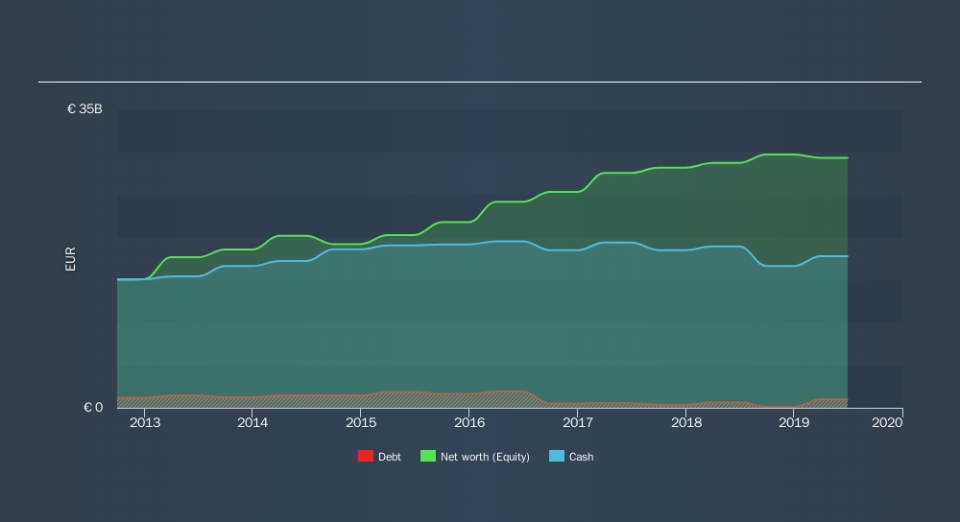Is AUDI (ETR:NSU) Using Too Much Debt?

Howard Marks put it nicely when he said that, rather than worrying about share price volatility, 'The possibility of permanent loss is the risk I worry about... and every practical investor I know worries about.' It's only natural to consider a company's balance sheet when you examine how risky it is, since debt is often involved when a business collapses. We can see that AUDI AG (ETR:NSU) does use debt in its business. But the more important question is: how much risk is that debt creating?
When Is Debt Dangerous?
Debt assists a business until the business has trouble paying it off, either with new capital or with free cash flow. If things get really bad, the lenders can take control of the business. However, a more usual (but still expensive) situation is where a company must dilute shareholders at a cheap share price simply to get debt under control. Having said that, the most common situation is where a company manages its debt reasonably well - and to its own advantage. The first step when considering a company's debt levels is to consider its cash and debt together.
See our latest analysis for AUDI
What Is AUDI's Debt?
As you can see below, at the end of June 2019, AUDI had €965.0m of debt, up from €647.0m a year ago. Click the image for more detail. But it also has €17.8b in cash to offset that, meaning it has €16.8b net cash.
How Strong Is AUDI's Balance Sheet?
We can see from the most recent balance sheet that AUDI had liabilities of €21.0b falling due within a year, and liabilities of €16.7b due beyond that. On the other hand, it had cash of €17.8b and €6.63b worth of receivables due within a year. So its liabilities outweigh the sum of its cash and (near-term) receivables by €13.3b.
This deficit isn't so bad because AUDI is worth a massive €34.4b, and thus could probably raise enough capital to shore up its balance sheet, if the need arose. But we definitely want to keep our eyes open to indications that its debt is bringing too much risk. While it does have liabilities worth noting, AUDI also has more cash than debt, so we're pretty confident it can manage its debt safely.
It is just as well that AUDI's load is not too heavy, because its EBIT was down 21% over the last year. Falling earnings (if the trend continues) could eventually make even modest debt quite risky. There's no doubt that we learn most about debt from the balance sheet. But it is AUDI's earnings that will influence how the balance sheet holds up in the future. So when considering debt, it's definitely worth looking at the earnings trend. Click here for an interactive snapshot.
Finally, a company can only pay off debt with cold hard cash, not accounting profits. AUDI may have net cash on the balance sheet, but it is still interesting to look at how well the business converts its earnings before interest and tax (EBIT) to free cash flow, because that will influence both its need for, and its capacity to manage debt. In the last three years, AUDI's free cash flow amounted to 36% of its EBIT, less than we'd expect. That's not great, when it comes to paying down debt.
Summing up
While AUDI does have more liabilities than liquid assets, it also has net cash of €17b. So although we see some areas for improvement, we're not too worried about AUDI's balance sheet. Over time, share prices tend to follow earnings per share, so if you're interested in AUDI, you may well want to click here to check an interactive graph of its earnings per share history.
If you're interested in investing in businesses that can grow profits without the burden of debt, then check out this free list of growing businesses that have net cash on the balance sheet.
We aim to bring you long-term focused research analysis driven by fundamental data. Note that our analysis may not factor in the latest price-sensitive company announcements or qualitative material.
If you spot an error that warrants correction, please contact the editor at editorial-team@simplywallst.com. This article by Simply Wall St is general in nature. It does not constitute a recommendation to buy or sell any stock, and does not take account of your objectives, or your financial situation. Simply Wall St has no position in the stocks mentioned. Thank you for reading.

 Yahoo Finance
Yahoo Finance 
